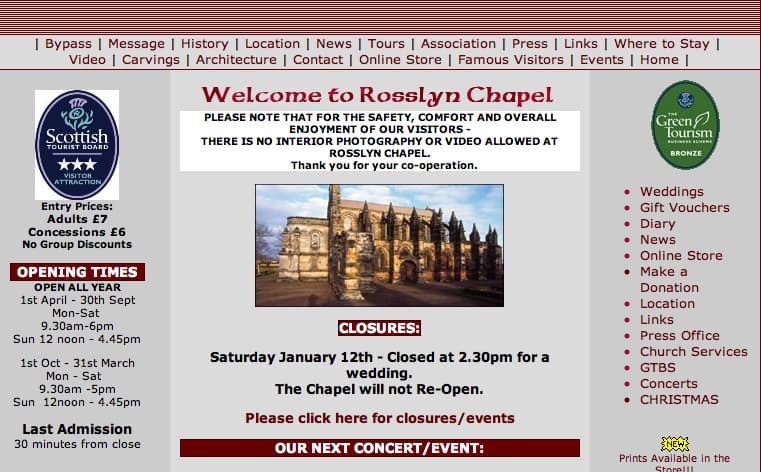Photographers have criticised a medieval chapel featured in The Da Vinci Code movie after it banned photography on health and safety grounds blaming cracked and uneven flooring.
The 15th century chapel, near Edinburgh in Scotland, is featured in Dan Brown?s book The Da Vinci Code and subsequent blockbuster movie of the same title starring Tom Hanks.
The chapel has long been the subject of legends connected with the ?Holy Grail?.
After the film?s release, in 2006, visitor numbers reportedly shot up five times, to 170,000.
Prior to the ban, which took effect on 2 January, Colin Glynne-Percy, director of the Rosslyn Chapel Trust, told the Edinburgh Evening News: ?The problem is one we have had for quite a while because the chapel is quite dimly lit and there are cracked and uneven slabs. When you then have a large group of people wandering around looking at the little screens on digital cameras – and not where they are going – it can lead to people tripping and stumbling.?
Among those angered by the move is Edinburgh-based photographer Malcolm Fife, who told Amateur Photographer magazine (AP) that this was an example of ?yet another restriction on photographers?, suggesting instead that ?it may be a plot to make visitors buy postcards from the large gift shop?.
Also incensed is photography enthusiast Brian Saberton, who described the news as ?astonishing and alarming?.
In an email to AP, Saberton wrote: ?This decision seems to be yet another example, not only of the prevailing nanny state mentality but also of the desire of officialdom to pick on photography as something that needs to be banned.?
Despite repeated requests – over the course of several days – the chapel?s director failed to respond to our inquiries.
A message posted on the chapel?s website tells potential visitors: ‘Welcome to Rosslyn Chapel. Please note that for the safety, comfort and overall enjoyment of our visitors there is no interior photography or video allowed at Rosslyn Chapel.?
In the past the chapel has reportedly used tape to cordon off some of the worst affected parts of the floor.
The chapel trust apparently decided that a complete ban on photography was the best course of action to take on the basis of the health and safety review.
Now a tourist hotspot Rosslyn Chapel was founded in 1446 by Sir William St Clair.







